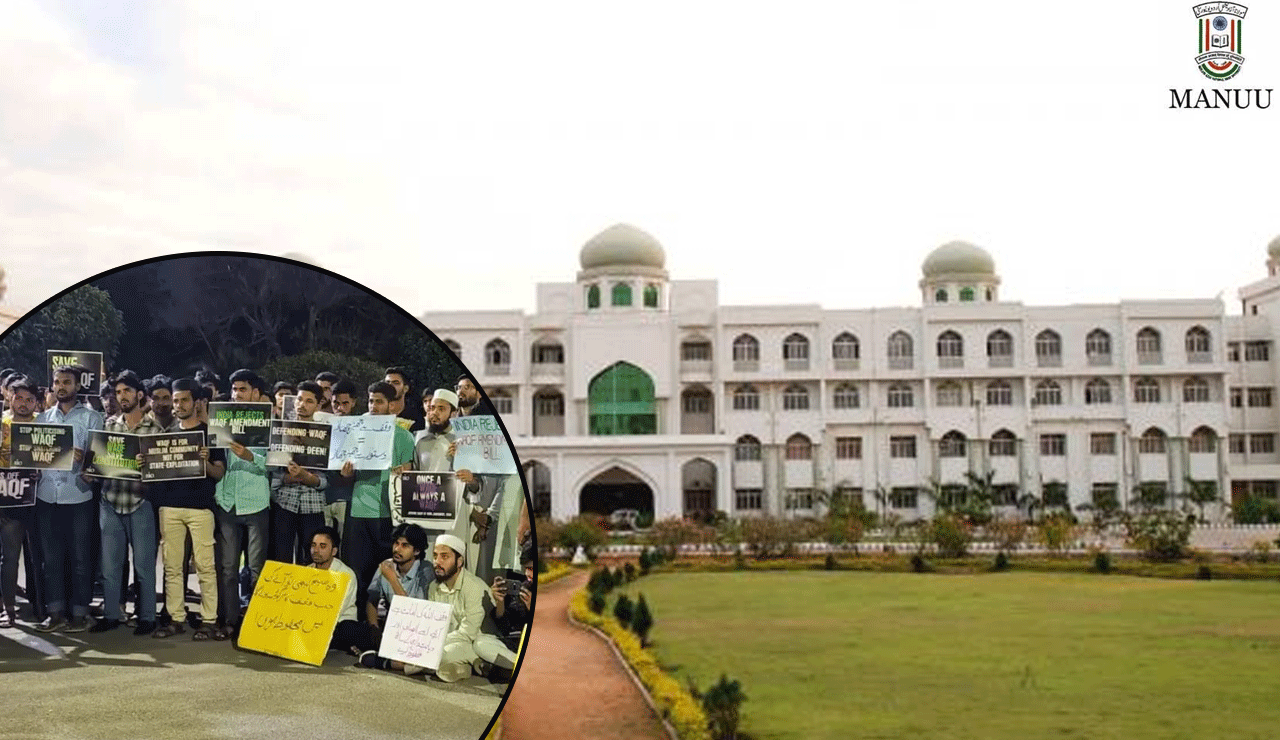MANUU Students Protest Against “Anti-Muslim” Waqf (Amendment) Act in Hyderabad
Students at Maulana Azad National Urdu University (MANUU) staged a protest on Monday night against the recently enacted Waqf (Amendment) Act, calling it “anti-Muslim” and “discriminatory.”

Hyderabad: Students at Maulana Azad National Urdu University (MANUU) staged a protest on Monday night against the recently enacted Waqf (Amendment) Act, calling it “anti-Muslim” and “discriminatory.” The protest, organized by a coalition of student groups, voiced strong opposition to the Act, which they believe undermines Muslim religious rights and heritage.
Table of Contents
Coalition of Student Groups Condemn Waqf (Amendment) Act
The protest was led by various student organizations, including the All India Students Federation (AUSF), Fraternity Movement, Students Islamic Organisation (SIO), and Girls Islamic Organisation (GIO). The demonstrators gathered at the MANUU campus in Hyderabad to express their unified opposition to what they termed as a state-backed attempt to erode Muslim heritage and religious rights.
Concerns Over Waqf Autonomy and Government Interference
Shaikh Mudassir, the SIO MANUU president and a PhD scholar, condemned the Act for dismantling Waqf autonomy. According to Mudassir, this move targets Muslim heritage while leaving similar institutions of other communities unaffected. “The government is openly targeting Waqf properties and Muslim heritage,” he said, stressing that this was a direct attack on the religious freedom of Muslims in India.
Violation of Constitutional Rights, Say Protesters
Umar Farooq Qadri, the vice president of Fraternity Movement, highlighted that the Waqf (Amendment) Act violates Article 26 of the Indian Constitution, which guarantees religious freedom. He called the Act part of a “hypocritical narrative of Muslim welfare” put forth by the ruling party.
Echoing similar sentiments, Ayesha Anjum, an MA student and GIO member, argued that the government’s move was a direct threat to the religious freedoms of India’s Muslim community.
Calls for Protection of Waqf Properties
Swaleh Ansari, an AUSF member and PhD scholar, criticized the Act for not addressing issues of corruption or encroachment on Waqf properties. Instead, he argued, the law empowers government interference, leading to potential seizures of Waqf properties, further undermining the autonomy of the Muslim community’s religious institutions.
Also Read: Tahawwur Rana’s Extradition to India Finalized: NIA to Take Custody After US Court Rejection
Growing Opposition to the Act
The protest at MANUU is part of a growing movement against the Waqf (Amendment) Act, with students and activists across India voicing their concerns. Critics argue that the Act is a significant infringement on religious autonomy and calls for an urgent review of the law to protect the interests of Muslim institutions and their heritage.
As the debate continues to unfold, the protestors remain committed to challenging the Act, urging the government to reconsider its approach to the management and protection of Waqf properties.
